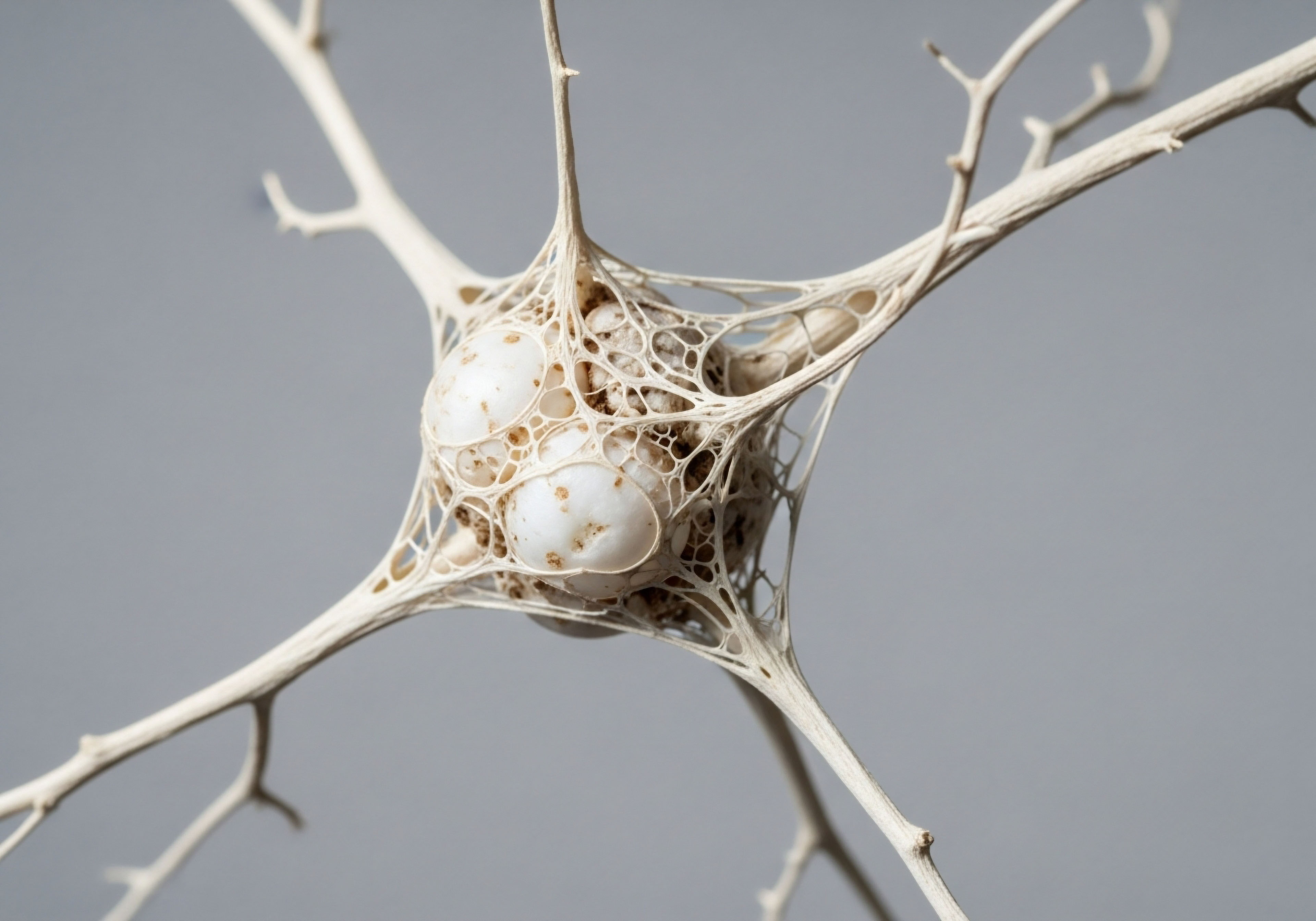

The Orchestration of Peak Human Performance
The human body operates as a sophisticated biological system, a marvel of engineering that requires precise communication to function optimally. At the core of this intricate network lies the endocrine system, the master conductor orchestrating virtually every physiological process.
Hormones, the chemical messengers of this system, dictate our energy levels, mood, metabolic rate, cognitive acuity, reproductive capabilities, and our very capacity for resilience and vitality. Understanding the endocrine system is not merely an academic pursuit; it is the key to unlocking profound levels of personal performance and well-being.
This system acts as the body’s primary internal communication network, translating genetic blueprints into tangible biological function. It governs growth and development, tissue function, metabolism, sleep-wake cycles, and our adaptive responses to stress. When this language is clear and the hormonal signals are robust, individuals experience sustained energy, sharp mental focus, balanced emotional states, and a resilient physical form.
Conversely, subtle shifts or significant dysregulation in endocrine signaling can manifest as fatigue, brain fog, weight management challenges, mood disturbances, and a diminished capacity to thrive.
Mastery of one’s endocrine health is fundamental to proactive anti-aging and the pursuit of peak human potential. It represents a shift from passively accepting biological decline to actively engineering one’s physiology for sustained excellence.
Decoding the endocrine system’s secret language empowers individuals to move beyond symptom management and address the root causes of suboptimal performance, forging a path toward enduring vitality and peak function. This is the domain of the Vitality Architect, where biology is understood, optimized, and directed toward a higher state of being.
The endocrine system is the silent architect of our daily experience, shaping our drive, our focus, and our physical capabilities. Its influence permeates every aspect of our lives, from the moment we awaken to our capacity for recovery and regeneration. To comprehend its mechanisms is to gain unprecedented insight into the self, providing the foundational knowledge required for comprehensive biological optimization.

The Central Role of Hormonal Signaling
Hormones are the executive directors of cellular activity. Released by specialized glands, they travel through the bloodstream to target cells, binding to specific receptors and initiating cascades of biological responses. This signaling process is critical for maintaining homeostasis ∞ the stable internal environment necessary for life. Without precise hormonal regulation, fundamental processes like nutrient utilization, temperature control, and cellular repair would falter, leading to systemic dysfunction.

Why Hormonal Balance Is Non-Negotiable for Performance
Peak performance, whether in the boardroom, on the athletic field, or in the pursuit of intellectual mastery, is intrinsically linked to optimal endocrine function. Hormones like testosterone and estrogen influence muscle synthesis, bone density, and libido, directly impacting physical power and recovery. Thyroid hormones regulate metabolic rate, determining energy availability and body composition.
Cortisol, while essential for acute stress response, must be managed to prevent its chronic elevation, which can sabotage metabolic health and cognitive function. Insulin’s role in glucose metabolism underpins sustained energy and prevents the metabolic dysregulation that hinders all forms of performance.


The Engineering Principles of Endocrine Mastery
Mastering the endocrine system requires a deep understanding of its core engineering principles ∞ the glands, the hormones they produce, and the sophisticated feedback loops that govern their activity. This knowledge forms the basis for strategic interventions aimed at recalibrating and optimizing hormonal profiles for enhanced vitality and performance.

Key Endocrine Glands and Their Hormonal Output
The endocrine system is comprised of several critical glands, each with distinct roles ∞
- Hypothalamus and Pituitary Gland: Often referred to as the master and the commander, these brain-based structures form the central control nexus. The hypothalamus releases releasing and inhibiting hormones that signal the pituitary gland. The pituitary, in turn, secretes tropic hormones that stimulate other endocrine glands.
- Thyroid Gland: Produces thyroid hormones (T3 and T4), which are crucial regulators of metabolism, energy expenditure, and body temperature.
- Adrenal Glands: Responsible for producing cortisol (the primary stress hormone), adrenaline, and noradrenaline, as well as smaller amounts of sex hormones. They manage the body’s response to stress and influence metabolism.
- Pancreas: Primarily known for its exocrine function in digestion, it also houses the islets of Langerhans, which produce insulin and glucagon, vital for blood glucose regulation.
- Gonads (Testes and Ovaries): Produce primary sex hormones ∞ testosterone in males and estrogen and progesterone in females ∞ essential for reproductive health, as well as influencing muscle mass, bone density, mood, and energy.

Sophisticated Feedback Loops ∞ The Body’s Regulatory Network
The endocrine system operates via intricate feedback mechanisms, predominantly negative feedback loops, to maintain hormonal balance and physiological stability. The Hypothalamic-Pituitary-Gonadal (HPG) axis exemplifies this. When sex hormone levels (like testosterone) drop, the hypothalamus signals the pituitary to release gonadotropins (LH and FSH), which then stimulate the gonads to produce more hormones.
As hormone levels rise, they signal back to the hypothalamus and pituitary to reduce their signaling, preventing overproduction. Disruptions to these loops, whether through aging, stress, or external factors, are central to endocrine dysregulation.
The Hypothalamic-Pituitary-Adrenal (HPA) axis governs the stress response. Chronic stress can lead to sustained activation of this axis, resulting in elevated cortisol levels. This prolonged elevation can suppress immune function, disrupt sleep, promote abdominal fat storage, and impair cognitive processes.

Mechanisms of Hormonal Optimization
When endocrine function deviates from its optimal state, strategic interventions can restore balance and enhance performance. These approaches are grounded in scientific understanding of hormonal action and regulation.
Hormone Replacement Therapy (HRT): For individuals experiencing age-related decline or specific deficiencies, HRT offers a direct method to restore hormone levels to physiological, or sometimes supra-physiological, optimal ranges. This includes Testosterone Replacement Therapy (TRT) for men and Estrogen/Progesterone Therapy for women, carefully monitored to align with individual biological needs and performance goals.
Average testosterone levels in men can decline by approximately 1% per year after the age of 30, impacting energy, mood, and physical capacity.
Peptide Therapy: Peptides are short chains of amino acids that act as signaling molecules, mimicking or modulating natural bodily processes. Therapies involving peptides like Sermorelin or Tesamorelin can stimulate the pituitary to release Growth Hormone (GH), influencing body composition, cellular repair, and metabolic function. Other peptides target specific pathways related to inflammation, recovery, and metabolic regulation.
Lifestyle Interventions: Foundational pillars of endocrine health include targeted nutrition, optimized sleep hygiene, and effective stress management. High-intensity exercise can stimulate GH and testosterone release, while consistent, quality sleep is critical for cortisol regulation and GH secretion. A nutrient-dense diet supports the building blocks for hormone synthesis and metabolic efficiency.

Biomarker Analysis ∞ Reading the Signals
Interpreting hormonal status relies on precise biomarker analysis. This involves blood tests to measure levels of key hormones, their binding proteins, and related metabolites. Understanding these metrics provides objective data to guide optimization strategies. Key markers include total and free testosterone, estradiol, progesterone, DHEA-S, cortisol (often via salivary or urinary tests), thyroid hormones (TSH, Free T3, Free T4), and IGF-1.
A comprehensive endocrine panel, assessed by a clinician experienced in performance optimization, is the starting point for any strategy. This data-driven approach ensures interventions are personalized and effective, aligning with the body’s unique biochemical landscape.


Strategic Interventions for Endocrine Supremacy
The decision to implement endocrine optimization strategies is a strategic one, guided by an individual’s current biological status, performance objectives, and a clear understanding of potential benefits and considerations. Timing and context are paramount in applying the principles of hormonal mastery.

Assessing Your Endocrine Landscape
The initial step in any endocrine optimization strategy is a thorough assessment. This involves comprehensive blood work to establish baseline hormone levels, understand metabolic markers, and identify any existing imbalances or deficiencies. This diagnostic phase is not about treating disease, but about understanding the current operational parameters of your biological system. Factors such as age, lifestyle, reported symptoms, and specific performance goals inform the scope of this assessment.
Regular monitoring is also critical. The body is a dynamic system, and hormonal profiles can fluctuate based on numerous internal and external influences. Periodic re-testing ensures that any implemented strategies remain aligned with optimal physiological function and allows for timely adjustments.

Factors Influencing Endocrine Timing and Strategy
Several factors dictate the appropriateness and timing of endocrine interventions ∞
Age-Related Decline: As individuals age, natural declines in hormone production are common. For men, this often involves a gradual decrease in testosterone, impacting energy, muscle mass, and libido. For women, menopause brings a significant shift in estrogen and progesterone levels, affecting mood, bone health, and metabolic function. Interventions are often considered when these declines lead to a noticeable reduction in vitality or performance.
Performance Goals: Individuals pursuing extreme levels of physical or cognitive performance may consider endocrine optimization earlier. This involves fine-tuning hormone levels to support muscle growth, recovery, endurance, and mental acuity beyond baseline physiological norms, always within a safe and monitored framework.
Lifestyle Stressors: Chronic stress, poor sleep, inadequate nutrition, and excessive exercise can significantly disrupt endocrine function. Addressing these foundational lifestyle factors is often the first line of intervention. If these measures are insufficient to restore balance, more direct hormonal support may be warranted.
Specific Health Conditions: Certain medical conditions can directly impact endocrine health. While this guide focuses on optimization, it is crucial to consult with a qualified physician for any diagnosed endocrine disorder.

The Strategic Application of Hormonal Support
When interventions are deemed appropriate, their application must be strategic and personalized.
Hormone Replacement Therapy (HRT): For men with confirmed low testosterone and associated symptoms, TRT can restore levels to a more robust physiological range, improving energy, mood, and physical capacity. For women, HRT can mitigate menopausal symptoms and support long-term health. The “when” for HRT is typically when deficiencies are confirmed and symptomatic, and the individual seeks to reclaim lost vitality and function.
Peptide Therapies: Peptides offer targeted approaches for specific outcomes. For instance, if GH and IGF-1 levels are suboptimal, impacting recovery and body composition, peptides like Sermorelin may be considered. The timing here is often dictated by specific performance bottlenecks or recovery challenges that are not adequately addressed by lifestyle or foundational HRT.
Nutritional and Sleep Optimization: These are universally applicable strategies. The “when” for prioritizing these is always ∞ they form the bedrock of endocrine health. They are the first interventions to implement and the last to abandon, regardless of other therapies.
The “when” is less about a fixed age and more about a confluence of biological indicators, functional limitations, and aspirational goals. It is a decision point where proactive self-mastery becomes the guiding principle, leveraging scientific advancements to engineer a superior state of biological performance.

Mastering Your Biological Destiny
The endocrine system is not a static entity to be passively managed; it is a dynamic, responsive network that can be understood, influenced, and optimized. Decoding its secret language empowers you to move beyond the limitations imposed by natural decline or lifestyle compromises.
It is the ultimate frontier of personal performance, where scientific precision meets ambitious self-mastery. By understanding the “why,” mastering the “how,” and strategically applying interventions at the right “when,” you become the architect of your own vitality, sculpting a biology capable of sustaining peak performance throughout your life. This is not about merely adding years to life, but about adding unparalleled life to your years.

Glossary

endocrine system

endocrine health

peak performance

metabolic health

feedback loops

hormone levels

hormone replacement therapy

peptide therapy




